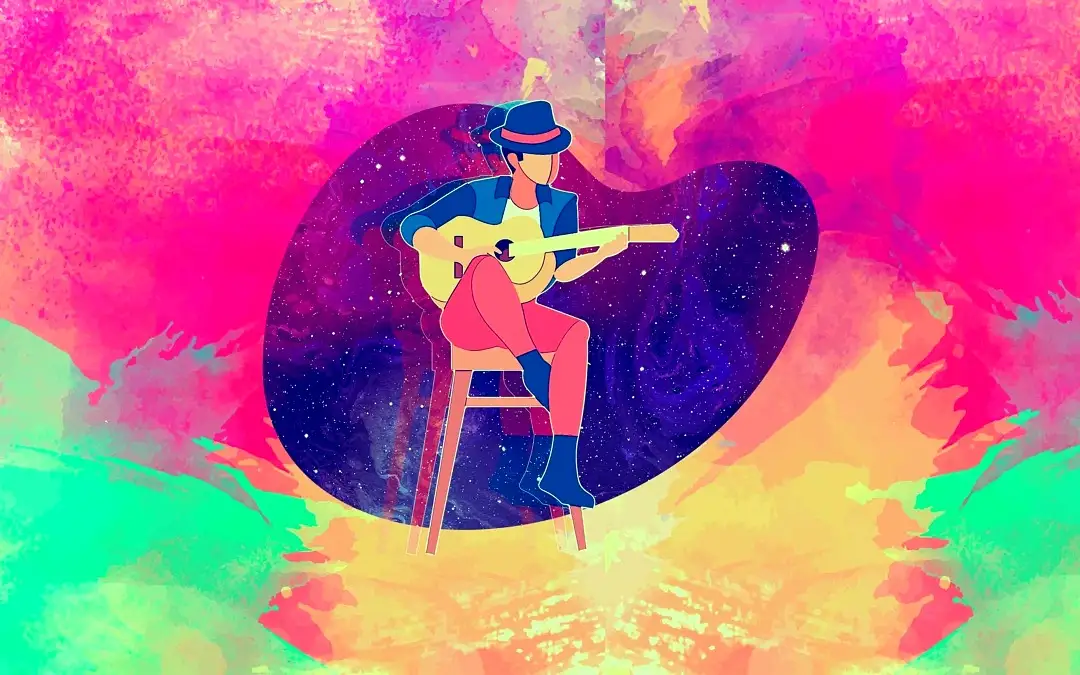Giving up on music is a decision almost every successful artist faces at one point of another. Are you doubting your chances of crafting a successful music career? Do you feel like you love music and want to create great songs but you're not sure if there's enough money for this path to be sustainable?
It’s no secret that making a living with music is an uphill battle. We’ve all had skeptical friends and family ask about our “back-up plan” in case it doesn’t work out. We’ve all had those months spent waiting for our next gig.
Whether you’re just starting out or you’ve been in the business for years, working in the music industry is a challenge that always has its ups and downs. Yet, despite these challenges, we keep going, chasing our passion – because there’s no way we could see ourselves doing anything else.
Below, we'll share exactly why you should pursue your music career now more than ever. We'll also share if it's a good idea to give up, and under what circumstances.
Common Reasons Why You Might Feel Like Quitting Music
No one said that facilitating a successful music career is easy. It isn't hard to get discouraged, even if you truly love music. With that in mind, here are some of the most common reasons that you might feel like you have to quit playing music for good.
You're becoming bored
Oftentimes, a professional band or solo artist will give the appearance that music is always fun. This is a complete facade. Just like any other profession, it's important to understand that music takes plenty of hard work, boredom and sacrifice. Boredom is part of every job and creative industries are no exception to the rule.
If you're struggling with writer's block , seek out ways to stop the cycle. There are plenty of ways to become inspired if you're willing to put in the work to find them. It's important to take a rest when needed, but don't use this as an excuse to abandon your musical path altogether.
Also, there's nothing wrong with having more than one artistic pursuit at any point in time. You can still continue to create music while picking up another hobby. Sometimes, you may need a quick hiatus or time to experience life in order to have something to inspire your tunes.
Therefore, take breaks when needed to bust boredom, but don't let this stop you from making tunes on a regular basis. For most music experts, consistency is key.

You feel like you're not getting enough recognition in the music industry
It's easy to get discouraged if you're constantly relying on outside metrics to determine the value of your band or life. Remember that recognition doesn't necessarily mean success and vice versa. You or your band should be creating for the sake of creation, nothing else. Music is it's own reward, and will continue you to reward you over the course of your life if you award it the attention and care it truly deserves.
Understandably, it's easy to get caught up the numbers of today's social-media obsessed world. With that in mind, take time to share experiences with those who truly value what you create. If you find yourself becoming consumed with the analytics that come with pursuing a musical path, maybe it's time to offload those responsibilities to a manager, someone else in your band, or a trusted colleague.
The people around you don't want you to follow your passion
Not everyone will be a cheerleader throughout your life, and that's okay. It's important to note that most naysayers haven't hand a band of their own, let alone attempted to play and original composition in public. Whenever you're discouraged by someone else, consider the source.
At the end of the day, it is your life, and if you want to play music, so be it. Don't let others derail you because they intend on navigating life in a different way. Band together with like-minded people in your community and start leading the life you've always wanted but were too scared to pursue.
If you can't find a community in your immediate surroundings, seek connection from online collaborators.
You feel like the music you're creating doesn't make an impact
Your music can matter to someone without you knowing it. When you feel like your music isn't creating a positive impact, remember how much your favorite songs mean to you.
If you're a part of a band, remember that whether you're a guitarist, singer or drummer, you matter to that system as a whole. A musician can create communities and connection by nature, so you're making an impact by creating art and choosing to play for those who can't.
You can also help yourself by seeking out other music lovers in your area. You may find volunteer opportunities where you can start to serve others directly with your sound. At the very least, becoming connected to a larger circle of musicians can help find a send of purpose within this sometimes isolating career.

You're unsatisfied with your band
The politics of a band or collaborators can very much put a damper on your enthusiasm for music throughout your life, let alone at gigs. It's possible that you're no longer connecting with your band and confusing this feeling with the desire to quit music entirely.
If you're unsure, seek out performance opportunities outside of your band and see how you feel. Sometimes, artists are better suited to play their own music, or shift to leaving their main band over the course of life, and that's perfectly acceptable.
If you have a gut feeling that it's time to quit, that's enough reason on it's own. Don't hinder yourself by staying in a group that detracts from your own artistic pursuits.
You're not truly giving it your all
One of the best ways to propel your success is to seek out honesty in your career. Even if you aren't aiming to make music your job, you can improve by prompting for honest feedback at your gigs or amongst colleagues.
This will help you determine if you're really giving your music all you've got. After all, even the most competent musicians have room to improve - Sometimes we need someone we trust to help us identify what we need to work on next in order to make something matter within our respective genres.
You're confident you've uncovered all of your skills
If you feel as though you've reached your peak point, maybe it's time to switch it up a little. Thankfully, there's plenty of aspects of the music business to explore. If you're a solo creator, maybe it's time to challenge yourself to be in a band. If you're a guitarist, maybe it's time to try your hand at beat-making.
As creatives, we're lifelong learners. Maybe you've reached a certain level in one aspect of your musical understanding, but there are plenty of skills within music to cultivate throughout your life. A producer could benefit from learning the trade of a songwriter and vice versa.
As it's often uncovered, the more you know, the more you learn what you don't know. Spend more time uncovering the nuances of what your creating, and you'll start to see points at which you can improve. Sometimes, uncovering obstacles is the best way to make progress.

Should your ever stop playing music?
Determining what age or at what point you should give up on music depends on why you started in the first place. If you made music initially to have fun or express yourself, even if that doesn't mean playing in front of crowds, there's no reason to quit.
While there's no way to guarantee that music will always be a clear path to make a feasible living, you can hold a lot of hope in working to improve your craft and enjoy the process along the way.
If you or your band pursues music in hopes of gaining money or a stable job, it might not be the right path for you. Even professional music makers have a highly irregular work schedule relative to those in other industries, and money is never guaranteed.
Decide whether or not music is still bringing you the joy that it used to. If it's no longer fun, it may be time to take a rest and come back to it later.
Remember that "good" music is different to everyone. Everyone is built with an idea and view point that's entirely their own - Your music is bound to matter to someone if you give it enough time to develop and cultivate.
Maybe you're not at the stage you'd like to be at currently, but it's far less likely you'll become worse rather than better over time if you put in the effort to push your music past its current point. Money will come if you will listen to your inner voice, work hard, and pursue opportunities that increase your chances of stumbling across luck.
Is it okay to take a break from making music?
Absolutely! A lot of times we make the idea of achieving our dream more stressful than it has to be by engaging in black and white thinking. You can take a hiatus from music without quitting. You can find success later in life.
Contrary to popular belief, you can easily find a musician who didn't blow up until they were 40+, or find successful musicians who discovered their love for music after doing something completely different in the world. Your dream doesn't have an expiration date.
There are millions of ways to manage breaking through to mainstream recognition. At the same time, it's important to be honest with yourself and realistic about what the most realistic timeline is for you. Know that there is no right age to follow your passion. What is important is that you take care of yourself, even if that means temporarily stepping away from your music at different points throughout your life.
How do you know if you really can pursue a music career?
You can really make a career in music if you're willing to navigate the sacrifices and learning curve it takes to become a professional artist. Musicians, just like any other creative professional, need to listen to the advice of those they look up to, not Mom, Dad, or anyone else who insists on your crafting a backup plan.
If you're willing to continually improve your craft, work on building your fan base, and understand that your success as a musician doesn't have to be tied to money or popularity of the general public, then you can certainly craft a career in the industry.
A lot of times, becoming a successful musician comes down to having a positive mindset, luck, and constantly working to cultivate your creativity. If you work hard and approach music by setting goals and milestones that focus on personal growth, you're sure to develop a sonic space of your own accord.

Why do so many musicians fail?
Music makers can fail for a whole number of reasons. For one, it's important to understand that there are plenty of other things that go into creating an amazing piece of music outside of the music itself. Think about some of your favorite creatives: All these people have a clear vision, not only sonically, but also visually and as an overall brand.
Many times, musicians fail because all spare time is put into the music alone, without giving thought to the other aspects of a robust career in the industry.
It's also easy for any artist to become distracted with any number of things. Many fail simply because they quit too early. You never know if your dream is right around the corner, so you owe it to yourself to keep pushing over the course of your life.
Instead of focusing on those who don't make the cut within the industry, it can be more helpful to look into the habits of those who do. Here are some of the common habits of successful musical creators:
1. They're flexible.
Success in a creative industry isn't defined by a single path. Those who are serious about "making it" need to be willing to be flexible throughout their journey, even if that means taking on arduous day jobs, staying patient, and working on their craft after coming home from a long day at work.
2. They have a positive attitude.
It's difficult to find success within music if you don't have the right attitude. Work on staying positive and learning as much as you can about your craft so that you can build confidence behind your technical and interpersonal skills.
3. They are in it for themselves.
Few people will tell you that it's a good idea to pursue music. This career path is certainly difficult, but it's worth it for those who are in it because they love it and can't imagine working towards anything else.
Like most skills, making songs gets easier with time. The hardest part is getting started and staying committed to your craft. In order to increase your chances of encountering luck within the field, it's wise to never stop seeking out ways to build your skills, though it will inevitably become easier over time as your music starts to facilitate deserved recognition.
What if I fail as a musician?
Every budding artist needs to realize that any musician with a successful music career has been a "failed musician" at many, many points throughout the journey to the top. There's simply no way to create great music without failing.
However, the good news is that failing is one of the best opportunities to learn from your mistakes and become a more skilled artist throughout your life. Talented people fail all of the time. The distinction is that they work to understand their failures rather than letting a small setback undermine their talent. Ability is built over years of consistent, focused practice, and pushing through, particularly when it's not super convenient or fun to do so.

6 Reasons You Shouldn't Give Up On A Career In Music
Whenever you feel like surrendering to the nay-sayers, remember these reasons to not give up on your music –
- There isn't one correct path.
- Fame doesn't equal success.
- You can make a positive impact.
- You shouldn't quit because of outside voices.
- Music is good for you.
- You only get one life.
1. There is no one correct path to success.
Next time you feel like comparing yourself to a famous and/or successful artist, remember that everyone’s journey is different. If you look into the backgrounds of some of today’s most successful people in music – many of them started from the ground up, just like you.
Lady Gaga
Take Lady Gaga, for example. Today, she is one of the world’s best-selling music artists, but back in the day (2006, to be specific), things were very different. She was dropped from Def Jam Records and spent the next year hustling in New York performing neo-burlesque shows. She didn’t get to release her debut album until 2 years later, and even then, she was still performing in small venues (including an IKEA parking lot – not kidding).
Doja Cat
While Doja Cat is one of the biggest artists today, it's important to note that she's been a signed artist since 2013, only to reach her unpredictable breakthrough in 2018 with, "Mooo!". Before this point the singer and rapper spent hours cultivating her own sound through Garageband in her room. Remember that even an "overnight success" tends to have a huge body of work behind it.
2 Chainz
2 Chainz was not an overnight success by any means. The rapper was a part of the group Playaz Circle for over a decade before breaking off and starting his solo journey. He wasn't a early twenty-something either - His debut album hit number one when he was 36 years old. All of the effort he put in over the course of his life was worth it.
There are countless other success stories from other musicians and creatives who took much less or much more time to reach success. But does that make any one of their stories more or less valid than another, just because they took a different path? Absolutely not!
Whether you’re playing small shows in local bars or recording music in your bedroom – don’t ever fear that you’re “doing it wrong.” Choosing the right path for you (and no one else) is what really matters.
2. You don’t have to be famous to be successful
For many people, the idea of success in music is making millions of dollars selling out stadiums and earning platinum records. While that is certainly not an impossible dream, it can get discouraging when you have to struggle just to get 100 streams on Spotify. Although you may not be selling out stadiums just yet, that doesn’t mean you can’t be successful in music. Always remember that success does not equal fame.
Some of the most successful people in the music industry aren’t “famous” at all. They are often the people working behind the scenes. People who might not be household names, but are making a living doing what they love and working in music.
These people may be the guitarist for a big-name artist, a music director for Taylor Swift’s tour, a session singer for TV and film, an audio engineer at a renowned studio, or an A&R rep at a record label.
These people may not be famous, but that in no way means they’re unsuccessful. We shouldn’t be defining success with fame – true success is being able to wake up and do what you love every day. If you’re making a living with your music, you have every right to call yourself a successful musician.

3. Your music has the power to make a positive impact
No matter what your background in music is, we can all agree that music can touch people in ways that nothing else can. We all have that one track that can cheer us up when we’re feeling down, or that one song that makes us want to get up and dance every time we hear it.
Music has the power to bring people together, raise awareness, spread joy, and even save lives. Who’s to say that the song you’re writing right now won’t be someone’s new anthem someday? Who’s to say that the artist you’re recording in your home studio won’t be the next artist to inspire millions?
These are the kinds of questions you should ask yourself the next time you’re feeling doubtful about your music. Never forget that your music can change lives and make a change for the better, whether it’s big or small.
4. You Shouldn't Quit Your Passion Based On Outside Metrics
When you started creating music, it probably wasn't to get a certain amount of streams or earn a particular salary. Ultimately, the only thing keeping you from music is yourself. You shouldn't give up something you truly love for the wrong reasons.
While not everyone will want to invest in music if it isn't profitable, those who truly love music should remind themselves regularly why they started in the first place. If you play music long enough and seek out regular ways to improve your craft, you're bound to make some progress within the music business even if this isn't directly tied to monetary gains.
Be realistic and remember that nothing good comes without it's own set of challenges. The best creatives are those who decide to invest themselves and what they love, particularly when it's hard.
5. Music Is Good For You
Like any other art form, creating music is undoubtedly good for you. It's a cathartic release that shouldn't be given up, just because your music career isn't progressing at the rate at which you'd like. You need your music as much as your audience. Creating art gives us a chance to reflect on our actions and interactions with others which usually leads to us becoming better human beings.
Most people only become discouraged with music in response to a lack of notoriety, or based on the opinions of others. Remember that the best part about playing music is the magic of playing itself.
It can be difficult to not depend on external validation, but if you can overcome the fear of pleasing others with what you create, you'll enjoy music for what it truly is - An amazing art form that's valuable for anyone and everyone to interact with, regardless of one's "clout" or status.
6. You Only Get One Life
As cheesy as it may sound, you only get one life, and therefore only one chance to cultivate a music career and pursue your dream job. While it's true that playing music on a professional level is not for everyone, if you truly want to dedicate your whole life to music, there's no reason to stop creating music for better or worse. You owe it to yourself to pursue your passion.
If you have the gift of being able to make music, the world needs to hear it. Your success will come, maybe tomorrow, or maybe in a few months, or a few years. Don't miss out on the opportunity to share your unique musical perspective with others.
On the way to that point, enjoy the journey, and embrace every struggle – these are the moments that will make you a better and stronger, and more talented musician. Don’t give up! Never stop making music unless you're sure that's what you truly want.





